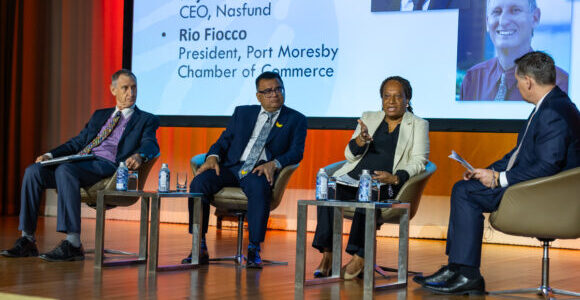While doing business in Papua New Guinea is never without its challenges, there have been some positive developments regarding some of the most-persistent business impediments.

Rio Fiocco, POMCCI President; Rajeev Sharma, CEO of Nasfund; and Susil Nelson-Kongoi, President of the Business Council of PNG, speaking at the 2025 Business Advantage PNG Investment Conference. Credit: BAI/Stefan Daniljchenko
A combination of improved export receipts and IMF-assisted market interventions from the Bank of Papua New Guinea has significantly reduced waiting times for foreign exchange (FX) orders in recent months, after 10 long years of FX shortages.
“We’ve had a big improvement in the FX situation, which has been the number-one concern for businesses,” confirmed Rio Fiocco, President of the Port Moresby Chamber of Commerce and Industry, at the 2025 Business Advantage PNG Investment Conference earlier this month.
“Now, for businesses, you can get your FX order filled usually within a week, which is a huge improvement from the two-to-three months it was taking last year.”
“In the regional centres, we see still face a lot of constraints, in terms of connectivity, logistics, energy access.”
At the same time, greater competition and more investment has seen PNG’s telecommunications sector well on the way to becoming a business enabler rather than a business impediment. Data consumption in PNG – a good indicator of growth in the sector – has already passed 150 gigabits per second and is growing exponentially.
“In 2015, the World Bank did some forecasts on how much data PNG would use in the future. We are eight years ahead of that forecast,” observed Vodafone PNG’s Chief Strategy Officer, Ronald Prasad at the conference.
With only 80 per cent of PNG’s population covered by the country’s mobile telecommunications operators, there is more work to do but the release this month by the National Information and Technology Authority of the 2600 MHz band for 5G services is sign of things to come.
Power to the people
“In the regional centres, we see still face a lot of constraints, in terms of connectivity, logistics, energy access,” observed the President of the Business Council of PNG, Susil Nelson-Kongoi. “These are things we have to address.”
The parlous condition of state-owned power utility PNG Power Limited (PPL), has again been in PNG’s daily newspapers but has of course been known about for some time.
While there are few quick fixes after years of under investment in PPL, at least we have had welcome transparency under the leadership of new CEO Paul Bayly, who is a business turnaround expert.
Bayly’s presentation to the PNG Investment Conference acknowledged the difficult financial state of the business but also outlined a number of new projects designed to improve the company’s bottom line and stabilise power provision across the country’s two largest energy grids. All in business will be hoping he succeeds in this challenging role.
Also on energy, there have been positive moves to address fuel supply issues related to the problems faced by Puma Energy, at one time PNG’s major fuel importer. The commissioning of the bright orange Jet A1 fuel tanks adjacent to Port Moresby’s Motukea Port is only months away.
Rising concerns
In a couple of months, work will begin on collecting data for the Business Advantage PNG/Westpac PNG 100 CEO Survey, PNG’s leading business confidence survey.
The survey tracks businesses’ concerns about key impediments and, with FX and telecommunications causing less headaches, other issues look likely to be a focus. Anecdotally, one of these looks like to be law and order, where there is rising concern among business leaders.
The Business Council of PNG’s June Business Protection Report highlights a rise in “survival crimes” (where the intention of the offender is to have basic needs to consume food, clothing and hygiene), as well as rising cyber crime and weak law enforcement as key risks facing business.
“We’ve really called on the government for urgent action, especially in relation to expanding the police coverage to protect critical infrastructure such as the ports and the ICT networks also to strengthen the national cyber security centre,” said Nelson-Kongoi.
She also noted that jobs for small business and grants for young people were necessary “to combat some of the unrest that we saw last year.”
Capacity constraints
Santos’ CEO Kevin Gallagher this week said the project partners in the TotalEnergies-led Papua LNG project were looking at a final investment decision “hopefully, early in the new year.”
An issue which is likely to become more of a concern should some of PNG’s major resources projects get the green light is human resources, as it was during PNG’s last LNG boom.
“Human capacity remains an issue,” asserted Nelson-Kongoi, who also runs the Institute of Banking and Business Management. “We’ve got pockets of world class technical skills but there are also skills gaps that still exist, especially around project management and managerial/supervisory roles.”








Speak Your Mind